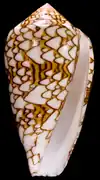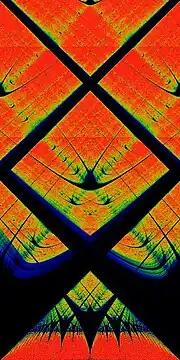Amie Wilkinson
Amie Wilkinson (born 1968) is an American mathematician and Professor of Mathematics at the University of Chicago.[1] Her research topics include smooth dynamical systems, ergodic theory, chaos theory, and semisimple Lie groups.[1] Wilkinson, in collaboration with Christian Bonatti and Sylvain Crovisier,[2][3] partially resolved the twelfth problem on Stephen Smale's list of mathematical problems for the 21st Century.[4]
Amie Wilkinson | |
|---|---|
| Born | 1968 (age 54–55) |
| Nationality | American |
| Occupations |
|
| Spouse | |
| Relatives | Leland Wilkinson (father) Alec Wilkinson (uncle) |
| Awards | |
| Academic background | |
| Education | |
| Doctoral advisor | Charles C. Pugh |
| Academic work | |
| Institutions | Northwestern University, University of Chicago |
| Main interests | |
| Website | math |
Wilkinson was named a fellow of the American Mathematical Society (AMS) in 2014.[5] She was elected to the Academia Europaea[6] in 2019 and the American Academy of Arts and Sciences in 2021.[7] In 2020, she received the Levi L. Conant Prize of the AMS for her overview article on the modern theory of Lyapunov exponents and their applications to diverse areas of dynamical systems and mathematical physics.[8][9]
Biography
She received a Bachelor of Arts degree in Mathematics from Harvard University in 1989 and a PhD in Mathematics from the University of California, Berkeley in 1995 under the direction of Charles C. Pugh.[10] She is currently a professor of mathematics at the University of Chicago and was previously a professor of mathematics at Northwestern University. [11]
Work
Wilkinson's work focuses on the geometric and statistical properties of diffeomorphisms and flows with a particular emphasis on stable ergodicity and partial hyperbolicity. In a series of papers with Christian Bonatti and Sylvain Crovisier, Wilkinson studied centralizers of diffeomorphisms[12][13] settling the C1 case of the twelfth problem on Stephen Smale's list of mathematical problems for the 21st Century.[14]
Awards
Wilkinson was the recipient of the 2011 Satter Prize in Mathematics,[10] in part for her work with Keith Burns on stable ergodicity of partially hyperbolic systems.[15]
She gave an invited talk, "Dynamical Systems and Ordinary Differential Equations", in the International Congress of Mathematicians 2010 in Hyderabad, India.[16]
In 2013 she became a fellow of the American Mathematical Society, for "contributions to dynamical systems".[17] In 2019 she was elected to the Academia Europaea.[18] In 2020 she received the Levi L. Conant Prize of the AMS.[19] She was elected to the American Academy of Arts and Sciences in 2021.[20]
Wilkinson has been featured in articles in Quanta Magazine.[21][22] Wilkinson is a member of the Board of Advisers of Scientific American.[23]
Personal life
Wilkinson married Benson Farb on December 28, 1996. [24] They are professors in the same department.
References
- "Amie Wilkinson | Department of Mathematics | The University of Chicago". mathematics.uchicago.edu. Retrieved 2021-10-26.
- Bonatti, Christian; Crovisier, Sylvain; Wilkinson, Amie (2008). "C1-generic conservative diffeomorphisms have trivial centralizers". Journal of Modern Dynamics. 2: 359–373. doi:10.3934/jmd.2008.2.359.
- Bonatti, Christian; Crovisier, Sylvain; Wilkinson, Amie (2009). "The C1-generic diffeomorphism has trivial centralizer". Publications Mathématiques de l'IHÉS. 109: 185–244. arXiv:0804.1416. doi:10.1007/s10240-009-0021-z. S2CID 16212782.
- Smale, Steve (1998). "Mathematical Problems for the Next Century". Mathematical Intelligencer. 20 (2): 7–15. CiteSeerX 10.1.1.35.4101. doi:10.1007/bf03025291. S2CID 1331144.
- "2014 Class of the Fellows of the AMS" (PDF). Notices of the AMS. Vol. 61, no. 4. AMS. April 2014. pp. 420–421. Retrieved 2016-03-21.
- "Amie Wilkinson", Elected members 2019, Academia Europaea, retrieved 2019-09-05
- "New Members Elected in 2021". American Academy of Arts and Sciences. Retrieved 2021-04-22.
- Levi L. Conant Prize 2020
- "News from the AMS". American Mathematical Society. Retrieved 2021-10-26.
- "2011 Satter Prize" (PDF). Notices of the AMS. Vol. 58, no. 4. AMS. April 2011. pp. 601–602. Retrieved 2016-03-21.
- Janofsky, Adam (12 March 2013). "Q&A: Amie Wilkinson". The Chicago Maroon. Chicago. Retrieved 30 September 2023.
- Bonatti, Christian; Crovisier, Sylvain; Wilkinson, Amie (2008). "C1-generic conservative diffeomorphisms have trivial centralizers". Journal of Modern Dynamics. 2: 359–373. doi:10.3934/jmd.2008.2.359.
- Bonatti, Christian; Crovisier, Sylvain; Wilkinson, Amie (2009). "The C1-generic diffeomorphism has trivial centralizer". Publications Mathématiques de l'IHÉS. 109: 185–244. arXiv:0804.1416. doi:10.1007/s10240-009-0021-z. S2CID 16212782.
- Smale, Steve (1998). "Mathematical Problems for the Next Century". Mathematical Intelligencer. 20 (2): 7–15. CiteSeerX 10.1.1.35.4101. doi:10.1007/bf03025291. S2CID 1331144.
- Burns, Keith; Wilkinson, Amie (2010). "On the ergodicity of partially hyperbolic systems". Annals of Mathematics. 171 (1): 451–489. doi:10.4007/annals.2010.171.451.
- "ICM Plenary and Invited Speakers since 1897". International Congress of Mathematicians. Archived from the original on 2017-11-08. Retrieved 2013-08-15.
- "2014 Class of the Fellows of the AMS" (PDF). Notices of the AMS. Vol. 61, no. 4. AMS. April 2014. pp. 420–421. Retrieved 2016-03-21.
- "Amie Wilkinson", Elected members 2019, Academia Europaea, retrieved 2019-09-05
- Levi L. Conant Prize 2020
- "New Members Elected in 2021". American Academy of Arts and Sciences. Retrieved 2021-04-22.
- Hartnett, Kevin (2019-06-13). "A Mathematician Whose Only Constant Is Change". Quanta Magazine. Retrieved 2021-10-26.
- Strogatz, Steven (2021-05-03). "Amie Wilkinson Sees the Dynamic Chaos in Puff Pastry". Quanta Magazine. Retrieved 2021-10-26.
- "Board of Advisers". Scientific American. Retrieved 2022-04-06.
- "Amie Wilkinson, Benson S. Farb". New York Times. 29 December 1996. Retrieved 2021-12-14.

